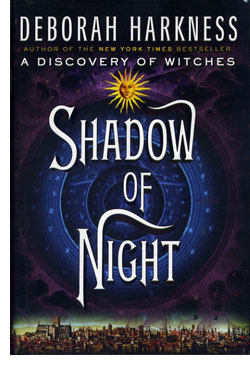 |
 |
 Deborah Harkness
Deborah Harkness
Shadow of Night
Viking / Penguin
US First Edition Hardcover
ISBN 978-0-670-02348-6
Publication Date: 07-10-2012
584 pages, $28.95
Date Reviewed:07-27-2012
Reviewed by: Rick Kleffel © 2012
Index:
Fantasy
General Fiction
Historical fiction and non-fiction both face the same difficult task. It all comes down to the details. Any writer will aver that research is immensely enjoyable and that it's easy to accumulate a wealth of minutia about any given particular period of history, no matter what the scope of the work is. The difficulty comes in deciding just which details make the story work and which, no matter how intrinsically intriguing they are to the writer, must be jettisoned to streamline the narrative.
In 'Shadow of Night,' the sequel to 'A Discovery of Witches', Deborah Harkness finds a unique solution to this problem. In the first novel, Diana Bishop, an Oxford scholar who studies alchemical manuscripts, requests an obscure document that leads her to discover her own heritage as a witch, as well as to uncover the existence of "creatures," primarily vampires and demons who live among us, unbeknownst to most humans. She falls in love with a 1,500 year-old vampire, now a genetic scientist named Matthew Clairmont. In order to pursue the manuscript and the mysterious origins of the "creatures," they use Diana's power to "timewalk." 'Shadow of Night Begins' an instant after the first book ends, as Diana and Matthew find themselves in late sixteenth century Oxfordshire, on Matthew's estate. The historian now must contend with actual history.
'Shadow of Night' is an outstanding, engaging sequel that successfully changes direction and ups the ante of the first book. Harkness is really in her element writing historical fiction, and her maguffin — that Diana has time-traveled from the 21st century to the past — allows her to have all sorts of fun playing what Diana thinks she knows about history against the everyday reality of living in a historical time. But this is only the first layer of plot. Diana and Matthew must also contend not only with their foes in the world of creatures, but also with those in the politics of sixteenth century Europe, England and the court Queen Elizabeth. It's a complicated and often thrilling mix.
Harkness has developed her characters carefully, particularly Matthew Clairmont, who is based on a real-life figure named Matthew Royden. This puts Diana and Matthew at the center of the School of Night, a group whose members included Christopher Marlowe and Sir Walter Raleigh. Harkness takes a lot of chances by turning these historical figures into creatures that fit into her shadow universe, but they all pay off. A large part of the fun of this novel is discovering Marlowe, who proves to be a real jerk, as a demon, and Raleigh, a vampire, as a crafty master of Realpolitik. Harkness upends our expectations and keeps the novel refreshing and fun.
The prose here is colored largely by Diana's perceptions and her misplaced expectations. Harkness works a sort of science-fictional slant into the mostly supernatural fantasy she's crafted, playing with alternate timelines and ripple effects in the future of this novel — our present. The details are plentiful and new enough to be entertaining, but never overwhelm the narrative of character arcs. Harkness has a deft, light touch that lets her write about dire events without succumbing to the gloom she's describing.
'Shadow of Night' does not pretend to stand on its own. Readers definitely want to start with 'A Discovery of Witches,' and by the time you reach the end of 'Shadow of Night,' you'll be anticipating the sequel. That said, Harkness keeps her story tightly reigned in and focused on the past in which it is set. It feels just right to read on its own. By having her main character, Diana Bishop, the historian, become trapped in real history, Harkness manages to multiply the pleasures of historical fiction by the pleasures of historical non-fiction. Readers will be happy to make a deal with the devil in the details.
|
 |
|
|
 |
| |
Review Archive
All Reviews alphabetized by author.
General Fiction
Non-Genre, general fiction and literature.
Horror
Supernatural fiction, supernatural horror and non-supernatural horror.
Science Fiction
Science fiction, science fantasy, speculative fiction, alternate history.
Fantasy
Fantasy, surrealism and magic realism.
Mystery
Crime, thrillers, mystery, suspense.
Non-Fiction
Non-Fiction, True Crime, Forteana, Reference.
Poetry
|
|
 |
|




